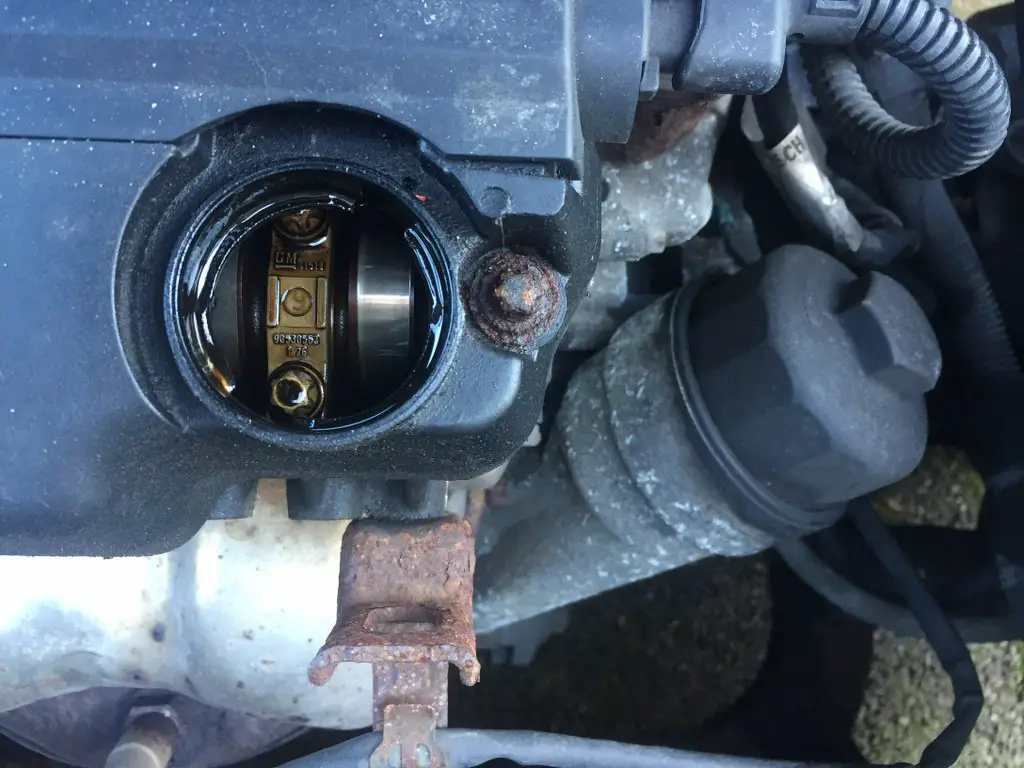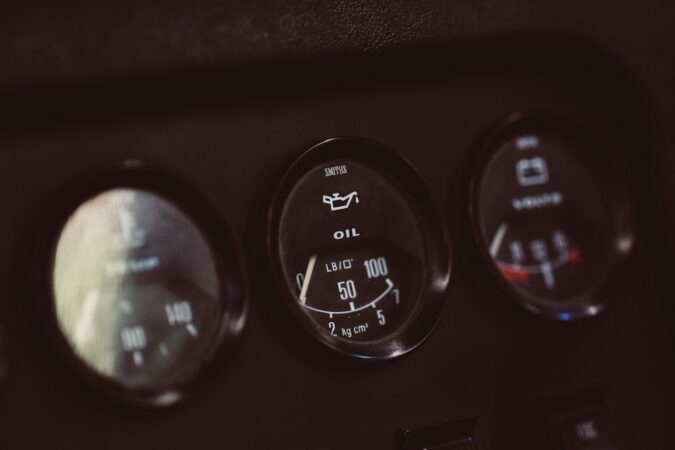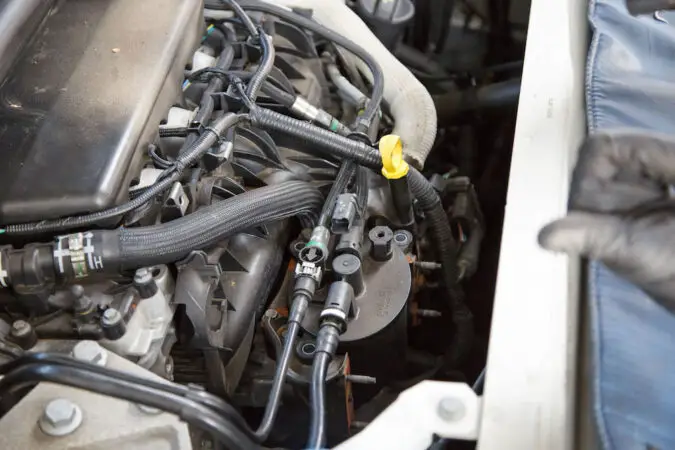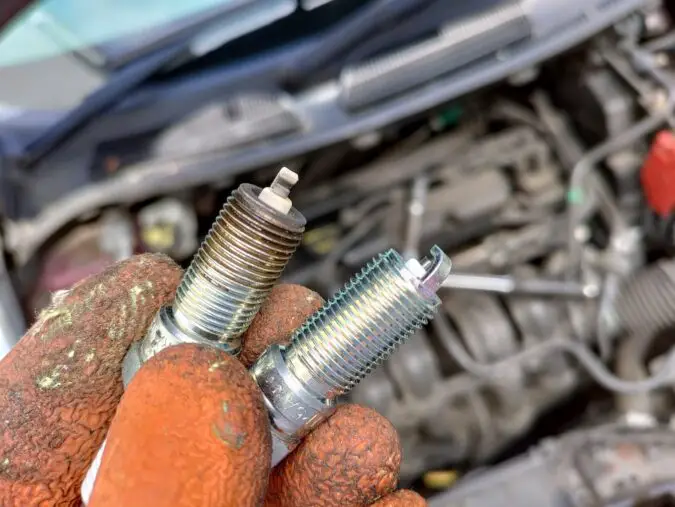If you recently have pulled your oil dipstick and your oils smell weird. Like there is gas in oil, this is a clear sign that something is wrong with the car. Oil should definitely not smell like gas.
This issue happens very often in gas-powered cars. Especially cars that are driven a lot, or cars that got to a certain age where they need more than just regular maintenance.
If this problem persists it is the best idea to visit your local mechanic or try to fix this issue DIY. Something that we are going to discuss in this article. Because 99% of the problems that we face on a daily basis with our cars have a proper DIY solution. The most important thing is to get the right input and learn to troubleshoot issues with your car.
When you troubleshoot problems, you learn the most about cars and what works and what doesn’t. Gas in oil definitely is a problem and we are going to dive deep into this issue. We will give you proper input and possible outcomes of this issue.
This issue is not that simple and it may require some deeper knowledge when it comes to cars. That’s why we are here and we are going to share this knowledge with you. If one day you have a problem with gas in oil, know how to solve it. So, if you are interested follow along till the end.
Oil Smells Like Gas
If you are having this issue in your car, it’s not the best situation. It is a bad situation, because your car should run on gas, and should use oil to lube up the pistons and rings.
Since the oil is mixed with gas, it means that the oil is contaminated and is not doing its job properly. This in other words translates that your engine will wear out prematurely.
Since there is not enough lubricity there will be a lot of friction among the parts. This issue may eat your cylinder walls and cause deep scratches. In the worst-case scenario, your engine will seize and get stuck.
This happens because gas doesn’t have the same lubricity characteristics as oil. When mixed with oil, the combo of gas and oil will ruin the characteristics of the oil and possibly ruin your engine.
If your engine seizes, it means that the repairs will be very costly. By costly I mean thousands of dollars if you want to replace the engine. Because if the cylinders are scarred, the engine is pretty much done.
You can also try to rebuild this engine. The rebuilding process is also costly and it is something that we are going to discuss at the end of the article. This process still, cannot guarantee you that your engine will be returned to factory condition. Namely because if the grooves are too deep it means that a lot of material needs to be taken off during the machining process and this will mean bigger pistons and rings.
If you want to go this route, you need to take your car where they do engine rebuilds properly and you will have some guarantee that will not fail again.
Symptoms Of Gas In Engine Oil
Gas In Oil, Symptoms #1: Oils Smell Like Gas
There are a couple of symptoms that can happen if you are having gas in your oil. The biggest symptom is the smell. This is a dead giveaway. Whenever you check your oil, give it a smell test on the dipstick. Or open your oil cap and give it a smell test. If there is gas in the engine, you will smell the gas right away. and that means that it’s time to start finding some solutions for your problem.
Gas In Oil, Symptoms #2: Low Oil Pressure
Another symptom is bad or low oil pressure. When you start your engine, it is important to look at the gauge that says oil pressure. If your engine doesn’t build up the oil pressure to the point where it needs to, it means that there is something wrong with the compression.
If you are dealing with this issue with low oil pressure, it means you need to start making a compression test on your engine. This is something that we are going to discuss later on how you can perform this task DIY.
Gas In Oil, Symptoms #3: Clouds Of Smoke
Another symptom of an engine that mixes the gas with oil is a cloud of smoke that comes out from the exhaust pipe. This smoke is usually white at the start, and when the problems worsen, the engine may also start to burn oil and produce black smoke.
If your smoke problem is bad, then there is something seriously wrong with the engine. Namely, high oil consumption. When you have black smoke, it is also a good idea to check the oil dipstick more often and observe the oil level and fill up your oil if it’s running low.
When Should You Get Worried
Having a gas smell (to find out more, check out our write-up on how to get gas smell off hands and why does my car smell like gas) coming from your oil doesn’t mean that you need to get serious all of a sudden. For some engines that are prone to problems, this is a normal situation. A little gas in the oil won’t hurt anyone. But if your engine smells like gas when you open the gas cap and this smell is over the top it means that your engine is pretty much ready to visit a mechanic.
If you are dealing with this issue, make an appointment with your mechanic as soon as possible. At the mechanic’s shop, they will take your car and do some troubleshooting on it. They will find the culprit and will fix your engine all being well.
Next up, we will learn a lot about the reasons why gas in oil happens to your car and how to fix these issues by using simple DIY tools, so follow along.
Why Does My Oil Smell Like Gas
Gas can get into the oil for many different reasons (you can find more insight in our guide on whether can you put diesel in a gas can), some of which we already mentioned and we are going to dive deep in this chapter on explaining the reasons why this unpleasant situation happens.
There are a couple of reasons why this happens and it’s not that big of a deal to troubleshoot the problem and get a solution.
Running Rich On Fuel
This is the simplest reason why this problem happens to you. Cars can run a rich air-to-fuel mixture that may mess up your system. Especially if you are running a carbureted car. Carbureted cars depend much on the reliability of the carburetor.
The carburetor is the main unit that acts on your gas input. If you press on the gas pedal, the carburetor releases fuel in the engine at somewhat high pressure. It’s not strong pressure like the modern injectors, but it gets the job done.
When cars get old, the seals inside the carburetor get loose and the air-to-fuel mixture varies. Fuel by itself has some impurities and these impurities can cause the carburetor to clog up, or release too much fuel. This fuel will not ignite and will leak through the piston rings directly into the engine. And when there is too much fuel it can lead to gas in oil problems.
The same thing can happen in fuel injection cars as well, but not that often. If your fuel injection car runs rich, you will probably get a check engine light on your dashboard. Then it’s time to diagnose the issue.
What Causes A Car To Run Rich
1. Bad Sensors
The mass airflow sensor is responsible to measure how much air is sucked into the engine. The oxygen (O2) sensor measures the exhaust gasses. The coolant temperature sensor also can cause your car to run rich if it gives a permanent cold signal. This means that it asks for the car to deliver more fuel when the fuel is not needed at all.
2. Bad Fuel Injectors
Bad fuel injectors may also cause your car to run rich and cause some gas-in-oil issues. Fuel injectors are controlled by a solenoid, these solenoids are responsible for opening up the injectors and injecting fuel into the cylinders. If the solenoid or injector is faulty, it may cause the car to run rich.
3. Engine Misfiring
If you are running rich on fuel, your car is probably going to misfire as well. Misfiring occurs when the fuel-to-air mixture is wrong and fuel isn’t ignited correctly. The fuel will not get ignited and will travel down to the cylinder walls and you will notice the smell of gas instantly.
These misfires will ruin the compression on your cylinders and your engine will start to lose power. When your engine is misfiring, you will notice a couple of symptoms.
- The car will be down on power. You won’t be able to accelerate as you used to. This will be caused by low oil pressure in the cylinders.
- It will idle rough. This is also a symptom of a car that misfires. The idle will be rough and the RPM will vary. The RPM can also drop to zero and the car will shut down.
- Vibrations will also appear. Since the engine does not run smoothly it will work unevenly and will start to shake.
- Engine sound will change and you will start hearing some strange noises from the affected cylinders.
- The check engine light will also appear. This is a good thing in this case because you will be notified that something in the engine needs checking and you will hopefully try to solve this issue.
- If you are running your car while misfires for a long time. It can cause your oil pan to fill up with gas and your engine will completely shut down or get locked. If it gets locked then your engine is probably done.
4. Bad Spark Plugs
Bad spark plugs can also be one of the reasons why there is gas in oil and the engine misfires. If your sparkplugs do not create a spark in the cylinder. It means that the fuel that is injected into the cylinder will not burn and that may cause the fuel to go down in the oil pan. Going down in the oil pan will create that gas smell that you are feeling when you open up your oil cap.
To learn more, check out our guide on whether can spark plugs cause a car not to start and the symptoms of loose spark plugs.
5. Diving On Short Distances
If you are driving a short distance can also be an issue. Mostly because there is always some fuel that passes the piston rings. This fuel when the oil gets hot is starting to evaporate and disappears. So, if you are running your car only for short distances your oil doesn’t get up to temperature, and the gas that is inside the oil pan will stay and mix with the oil.
This will result in gas in oil issues. If you are one of those drivers that don’t drive a lot and only drive short distances. It is a good idea to explore this possibility because you never know. Maybe something simple as this can be the problem.
6. Rarely Changed Oil
If you are one of those owners that change the oil very rarely. The old oil could be your problem. I’m saying this because if the car is driven very rarely and on short distances and especially if the engine misfires.
The oil will smell like gas. Changing your oil regularly will give a new life to your car and will improve its oiling. This means more quality oil the longer the engine will last.
7. Bad Piston Rings
If you have bad piston rings then you are in trouble. This can cause many headaches to a car owner. I’m telling you this because the piston rings are one of the most important pieces of the puzzle. If they are bad or broken your engine will mix gas and oil and will lose compression on the cylinder that is affected.
This issue is one of the issues that is telling an owner that his engine is due to be rebuilt. If not repaired soon after you notice this issue. Delaying this may cause the pistons to rub against the cylinder walls and make some deep scratches.
If your cylinder walls get busted then your engine is scrap metal (as you would when trying to find the catalytic converter scrap value). In the cylinder walls, there should not be any grooves and they should be perfectly smooth. If there are grooves it means that there is no compression, and no compression means no power at the wheels. The engine will eventually lock up and stop working.
This can lead to some really expensive repair bills. If you are running a classic V8 that has some value and is a matching motor to the car. Then it is a good idea to see the rebuild options if it’s some modern engine that runs on fuel injection. The best option is to replace it altogether. Because in the end, replacing will be a cheaper and long-term option.
How To Fix Gas In Oil
We discussed the possible reasons why this problem appears in your engine and now we are going to take a look at some troubleshooting methods on how you can get your engine fixed. Most of our solutions will not include visits to expensive mechanic shops and can be done at home with common tools.
Gas In Oil, Fixes #1: If Car Is Running Too Rich
As we discussed above, the car runs rich in fuel if the air-to-fuel mixture is not correct. If you are running a modern car that has fuel injection. The best thing to do in this case is to scan your car for codes. You can do this by getting a small OBD scanner. You can find these scanners on Amazon for a cheap and affordable price.
Plug the scanner into the OBD port of your car and start scanning. You will probably get some errors on this issue. The most important thing is to google these errors and learn more about them. If it’s a sensor you will have to replace it. Although sensors can be quite pricey. If a sensor is your issue, then go and get a quality OEM part. Don’t go for cheap options because they won’t work, or they will simply fail at some point in the near future.
If you run a carbureted car and your engine is running rich, then you need to adjust the carburetor to work with your engine properly. By doing this, I mean playing with the fuel-to-air mixture and trying to get it right.
This issue can also be caused by a very old carburetor. Carburetors are known to give up after many years. If the carburetor is bad then you can rebuild it. There are many rebuild kits, especially if you are running an Edelbrock carb on your car. Or you can just go to the car parts store and get a new one. They are not that expensive after all.
Gas In Oil, Fixes #2: What To Do If The Engine Misfires
If your engine misfires, then the best idea is to take a look at the spark plugs and coils. When these parts are not working properly, it means that your engine fuel-to-air mixture is messed up and you don’t get an explosion in the cylinder. This may cause fuel to come down in the cylinder and cause gas in oil issues.
How you can solve this issue if you are running a fuel injection car is to check your spark plugs. Give them a good inspection one by one and see if there is any carbon buildup. If there is carbon and they are completely black it means that the fuel doesn’t burn properly and they don’t create a spark.
Solving this issue is simple, just replace all of your spark plugs with a brand-new set of plugs.
If the problem persists then it is a good idea to check your coils. This can be done by scanning your car with an OBD scanner. The scanner will show which one of the coils is bad, and you should get a new coil and replace the one that doesn’t work.
If you run a carbureted car, then the best idea is to replace the spark plug wires also. If the problem persists then you need to check your distributor. Because if there is no spark you will probably need to replace the distributor as well.
Gas In Oil, Fixes #3: What If The Piston Rings Don’t Seal Properly
If the piston rings don’t seal properly it means that they are broken and the fuel will flow down into the oil pan. When the rings are failing you will instantly notice low oil pressure and loss of power. The pistons will rub against the cylinder walls and cause some major catastrophic damage to your engine. Because of this issue, it is not recommended to run an engine with low oil pressure for long periods of time.
If you want to be a good DIY mechanic, you need to get a compression tester and find which cylinders are low on compression. Then you need to pull out the engine and completely disassemble it into pieces. Find the bad cylinder and replace the O-rings. Make sure also that the cylinders are scratch-free and give it a little honing in the process.
After this reassemble the engine. It should be ok, but you never know with these engines. Sometimes the best thing is to replace it with a new one.
Gas In Oil: In Conclusion…
In this article, we learned a lot about why gas in oil is an issue and the possible reasons why this is a common problem.
There are many possibilities that come into play but the most notable are the bad air-to-fuel mixture and the misfires. Also, bad oil rings cause this issue as well, when the O-rings are bad this problem is most pronounced and the engine loses compression.
Then we went a step further and learned about the possible fixes for this issue, all of this achieved with simple DIY methods. Some of them are cheaper and some of them are more expensive options, depending on which route you want to go.
FAQs On Gas In Oil
If you’re still curious to learn more about gas in oil, our FAQs here might help…
Why Does My Car Smell Like Gas
There are numerous reasons why your car smells like gasoline. The most obvious one occurs right after you’ve just filled up at a gas station. It’s common for folks to spill a tiny bit of gas when they’re refueling. Or, if the gasoline odor stuck around after you’ve filled up. This isn’t anything to worry about and will go away eventually. Though, there are other, more serious reasons why your car smells like gas. It might be that you’re missing a gas cap. This can cause fuel vapor to slowly leak out of the tank. Other than that, your car might have an active fuel leak, likely caused by a ruptured fuel tank or a leaky fuel line. Besides that, faulty fuel injectors could also cause fuel vapor to leak out of the engine.
What Does Burning Oil Smell Like
Oftentimes, an oil leak can be found and diagnosed by its scent. In particular, a sharp and strong burning oil smell. This is the scent of hot motor oil leaking out of your engine and dripping onto hot components of your car. These hot parts can include the exhaust, for example. Over time, this smell would quickly turn into an unpleasant acrid smoky scent. This odor might also be followed by other symptoms, such as noticing how your car is overheating. If you notice a burning oil smell, it’s crucial that you pull over and give your car a check-over. Oil leaks can turn into a serious fire hazard if it continually leaks onto hot components and burn. Moreover, driving without the right oil level may cause significant issues to appear down the line.
Does Water Float On Gas
Water and gasoline can’t mix, and this is simply due to their varying densities. Gasoline is less dense (aka, it’s lighter in form) than water. For that reason, gasoline and water can’t mix and blend thoroughly into one. If they do come into contact with one another, water would sink to the bottom, while gasoline tries to float above the water. This is why the excess presence of water or moisture inside your gas tank is pretty bad. At first, it might not be seriously impactful, as the gasoline floating at the top of the gas-water mixture flows like normal. But, once fuel runs dry, the water that’s sunk at the bottom of the gas tank will start flowing through the fuel lines and into the engine. At this stage, you’ll start facing issues with starting up your engine.
How To Mix Oil And Gas
Typically, gasoline and oil shouldn’t mix, and it’s really bad if they do. However, there are instances in which you have to mix oil and gas together for a particular engine to work. This applies in the world of lawnmowers, for example, where its motors require the use of 2-stroke or 2-cycle fuel. In a 2-stroke motor or engine, this oil-and-gas mixture not only provides a source of power for combustion. But, that small percentage of oil also lubricates the engine’s internals, as well. To properly mix oil and gas, you have to get the gas-to-oil ratio right. Usually, it’s a 40:1 mixture, meaning that for every gallon of gasoline you add, you’ll need to include 3.2 ounces of special 2-stroke oil. Just pour them together into a gas can, and make sure you reference a manual to find the right ratio.
Can Low Oil Cause Misfire
Commonly, engine misfires are caused by ignition, electrical, mechanical, or sensor-related issues. While low oil isn’t usually the primary suspect for misfire problems, it can indirectly cause a misfire, too. For example, engines with variable valve timing rely on oil pressure to actuate valve timing changes and adjust the timing. If you don’t have enough oil in the engine, the lack of oil flow can result in improper valve timing operation. Thus, causing a misfire, in effect. Moreover, a lack of motor oil might’ve caused other serious internal damage or wear and tear inside the engine. In so doing, low oil may indirectly cause misfires. So, if your engine is misfiring, it’s a good idea to quickly check the motor oil, just in case.





3 comments
thanks for info. I am getting gas in oil.
During an oil change, one of the oil contaiers had old gas instead of oil. less than 2 ounces of the old gas made it in the oil pan. Will this 2 ounces of gas cause engine damage, or will it burn off during use. engine holds approximately 3 quarts of oil
If you can I would drain it and refill with fresh oil. It may burn off, but it will never be as good as flushing and refilling with fresh oil.